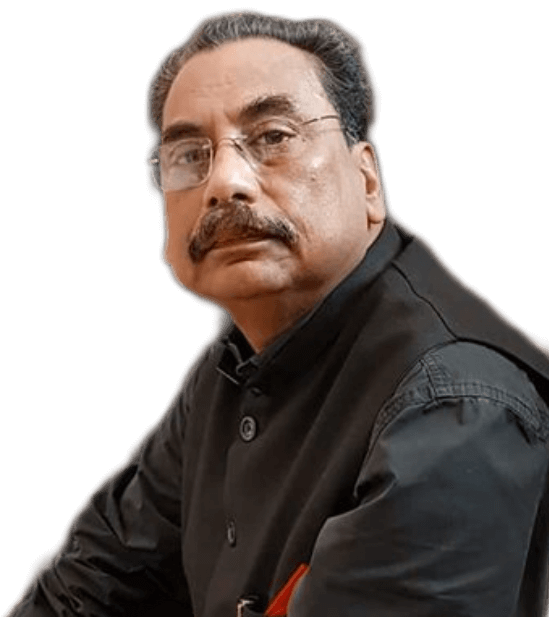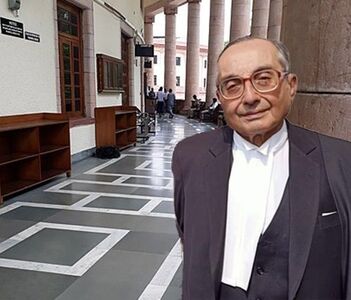Suddenly an image of Saktinath Mukhopadhyay in Supreme Court, with Reshmi Rea Sinha standing by his side, popped up in facebook timeline. I felt elated. I have always respected him deeply from the bottom of my heart for his triumph of effective advocacy backed by brilliant erudition.
Saktinath Mukhopadhyay is a Senior Advocate of Supreme Court and Calcutta High Court. He leads a long, vibrant and determined life. Arguably ahead of his time, he insisted on putting the client’s needs at the heart of every case that came before him. Even years later, he receives letters of thanks from the people he represented, some very heart wrenching.
I have the honour of meeting him several times and his commitment to equality and successful defense of cases places him apart.
Many winters back, I had gone to meet him at his Uttarpara palatial residence on a Sunday morning. But since I did not have an appointment, I was asked to wait and if time permits, he would give me an audition. I was asked to wait in an ante-room by the side of his chamber. It has a portrait of his wife and a lot of antiques. During the course of waiting I went round the corridor and found oil paintings of the ancestors of Saktinath Mukhopadhya hanging in the wall. There were also oil paintings of our God and Goddesses. There was also a wooden almirah full of pencils.
After a long wait which I enjoyed, looking round and talking to different people my turn came at the end. I went inside his chamber and he apologized for keeping me waiting, though I was one of the first to arrive. I told him it did not matter as I enjoyed going round his house, in the area allowed. Then I blurted about the almirah full of pencils : from Napoleonic Silver lead holder to children’s drawing short pencil. He smiled. He asked me how I knew about them from outside the glass. I shared with him that my father, Nirmal Chandra Kumar was an antiquarian, and I have some of them but never seen such a collection. Pencil with silverpoint of 1565. Then pencil in all shapes and sizes: most common pencil in hexagonal shape to cylindrical or triangular. Then the vast plethora of brands: Caran d'Ache,Chung hwa, Cretacolor, Bleistiftfabrik, Derwent, Dixon, Faber-Castell, Ticonderoga, Apsara, Nataraj, Koh-i-Noor, Lyra, Bleistift-Fabrik, Musgrave, Newell, Palomino, Staedtler, Tombow, Viarco and a whole host of others.
He appreciated my interest and said that the collection came down from his fore fathers many of them used pencils. The only addition he has done is recent including adding colour pencils of his grandchildren. Then he went on to say that after Sir Ashutosh Mukherjee who was appointed a puisne judge of the High Court, and subsequently served as its acting Chief Justice for a couple of years to become the Vice Chancellor of the University of Calcutta, my father had the largest library of books. I was pleased that he knew my father and was so humbled.
He then asked me what brought me to him and I narrated to him that there is an old ‘masi’ from a village who helped my mother with house work. After the demise of my mother she returned to her village. Most recently her ‘Bhita Mati’, ancestral land, has been grabbed and she has lost the case in the trial court. Her only hope is the High Court but she does not have the money to fight the case.
He listened to me and then told me that he does not take up cases at lower fees. As I got up to leave, he added however, tomorrow morning he will ask one of his junior to call me, who will take up the matter. But his fees has to be paid. As said, so done. An advocate called me and asked me to come over to High Court. I handed over a brief with photocopies of documents. I asked him his fees and cost for filing which he quoted but I found it minimal.
The day came for hearing. I was informed in advance and was told that I need not come. But I went. The case would come up for hearing after lunch break. I found the room and entered to find Saktinath Mukhopadhyay sitting in the bench for visitors. He saw me and asked me to sit. I was just going to sit in an empty chair a little far off. He called me by his side. A man came and handed over a square aluminum tiffin box. He opened and inside was four slices of cucumber and four slices of boiled carrot. That was his lunch.
The Judge entered after some time, the case was listed second. The junior advocate came and I was sure he will take up the case in earnest. To my surprise he whispered something to Saktinath Mukhopadhyay. In time, he got up and pleaded the case and then with a flourish left the courtroom. Before things dawned on me, I realised that actually he did take up the case. My eyes started to weld with tears. Needless to say the case was won. I took Masi to thank him. This time he did not make us wait. He got up with folded hands and said this was not required and asked if we have a vehicle.
Many years later a well-known corporate wanted an appointment which they were not getting. They requested me for an audition with Saktinath Mukhopadhyay. I took them and they carried sweets and a lot of gifts. When the time came we entered the chamber he refused to take the gifts. Then he heard the case. He said, that he guessed as much. Though not the Advocate on Record the opposite party had consulted him and he cannot accept the case. That was it. As we were leaving, he called me back to advice never to do this again and said that if the sweets were from my personal pocket he would have accepted. This is the kind of reputation the man enjoys.
I did exactly that, just after Puja Dasumi, I went over with some sweet to meet him. It was very late in the afternoon. He called me there were two students taking copious notes. I touched his feet and gave him the sweet which he called somebody to hand over. He asked me to sit in the chair by his side. He then rang the bell and asked for a person to be sent. A swami ji entered. He got up and received him with folded hands. As he sat down, the sweet I had given came back in plates for all of us, except him. As the Swamiji got up to leave he pulled out the top drawer completely containing some envelopes and currency notes. He just turned the drawer to the outstretched ‘uttariya’ of the monk. The monk was from Ramakrishna Mission.
Saktinath Mukhopadhyay belongs to the famous Jaykrishna Mukherjee family, though that is not his credential or qualification. Jaykrishna Mukherjee, a prominent Bengali landlord (zamindar) and social reformer. Born in 1808 in Uttarpara, Jaykrishna was the son of a businessman, Jagan Mohun Mukherjee. In 1830, Jaykrishna Mukherjee became a record-keeper in the office of the Collector of Land Revenue at Hooghly. During this time, several estates were put up for sale. Jaykrishna Mukherjee bought these estates and with time, and further acquisition, Jaykrishna Mukherjee’s reputation as a prominent landholder began to equal that of Dwarkanath Tagore. In fact, in 1838, when Dwarkanath established the Landholders Society, Jaykrishna was elected as a member. In fact it is Jaykrishna Mukherjee who started the Uttarpara Public Library which is the first of its kind in Asia. Located on the banks of the Hoogly river, this library opened to the public in 1859.
On 20th January, 2013 , during the Sesquicentennial celebrations of Calcutta High Court, it was Saktinath Mukhopadhyay who was given the honour to felicitate President Pranab Mukherjee at Netaji Indoor. Chief Justice of India Altamas Kabir was by his side.
In May 2011 when Trinamool formed the Government, Chief Minister , Mamata Banerjee had requested Saktinath Mukhopadhyay, known to be close to outgoing Finance Minister Asim Dasgupta, to take up the post of Advocate General of the state which he declined.
Although some of his colleagues took Judgeships, Saktinath Mukhopadhyay remains a Senior Advocate, one with an intellectual influence on the judiciary, through his understanding and interpretation of law, greater than that of any judge or academic. He works in various local education authorities, always deeply concerned with providing opportunities for the most disadvantaged, advocating community education and lifelong learning.

